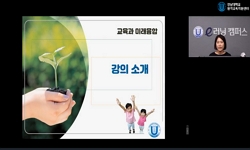This study evaluated its development and effects of sexual education module by applying the Barrow and Myers' problem-based learning model in order to improve a right to sexual autonomy for female high school students. This study designed two separ...
http://chineseinput.net/에서 pinyin(병음)방식으로 중국어를 변환할 수 있습니다.
변환된 중국어를 복사하여 사용하시면 됩니다.
- 中文 을 입력하시려면 zhongwen을 입력하시고 space를누르시면됩니다.
- 北京 을 입력하시려면 beijing을 입력하시고 space를 누르시면 됩니다.
문제중심학습을 이용한 성교육모듈 개발 및 효과 = Development and Effect of Sex Education Module Based on the Problem-based Learning Model
한글로보기부가정보
다국어 초록 (Multilingual Abstract)
This study designed two separate groups, experimental group (problem-based learning) and control group (lecture-based learning), and then compared any changes of their ability to sexual autonomy by treating sexual attitude scale and knowledge of sexual matters which are control variables as covariates.
Total 73 subjects, 40 students for the experimental group who are freshmen of U high school and 33 for the control group who are also freshmen of J high school, participated in the study.
Data were analysed by using SPSS WIN(version 12.0) with average, standard deviation, t-test and ANCOVA. The significance level was set to .05 level.
As a result, problem-based sex education has statistically significant difference on the right to sexual autonomy after controling the scale of their ability to sexual autonomy with their sexual attitude and knowledge of sexual matters.
To conclude, sex education module based on the problem-based learning model is effective on the right to sexual autonomy for female high school students.
This study evaluated its development and effects of sexual education module by applying the Barrow and Myers' problem-based learning model in order to improve a right to sexual autonomy for female high school students.
This study designed two separate groups, experimental group (problem-based learning) and control group (lecture-based learning), and then compared any changes of their ability to sexual autonomy by treating sexual attitude scale and knowledge of sexual matters which are control variables as covariates.
Total 73 subjects, 40 students for the experimental group who are freshmen of U high school and 33 for the control group who are also freshmen of J high school, participated in the study.
Data were analysed by using SPSS WIN(version 12.0) with average, standard deviation, t-test and ANCOVA. The significance level was set to .05 level.
As a result, problem-based sex education has statistically significant difference on the right to sexual autonomy after controling the scale of their ability to sexual autonomy with their sexual attitude and knowledge of sexual matters.
To conclude, sex education module based on the problem-based learning model is effective on the right to sexual autonomy for female high school students.
목차 (Table of Contents)
- 1. 서론 1
- 1. 연구의 필요성 1
- 2 연구목적 4
- 3 용어정의 4
- 1. 서론 1
- 1. 연구의 필요성 1
- 2 연구목적 4
- 3 용어정의 4
- 1) 문제중심 학습 4
- 2) 성적 자기결정권 5
- Ⅱ. 문헌고찰 6
- 1. 성교육과 문제중심학습 6
- 2. 성교육과 성적자기결정권 8
- Ⅲ. 연구방법 14
- Ⅲ-1. 문제중심학습을 이용한 성교육모듈 개발단계 15
- 1. 전반적인 학습목표 설정 15
- 2. 학습내용 분석 및 학습과제 선정 16
- 3. 문제상황사례 개발 18
- 4. 학습목표 설정 20
- 5. 보조학습자료 준비 21
- 6. 타당성 평가 및 수정보완 22
- 7. 문제중심학습 성교육모듈 완성 23
- Ⅲ-2. 성교육모듈 효과평가단계 23
- 1. 연구설계 23
- 2. 연구대상자 선정 24
- 3. 연구도구 24
- 1) 성지식 24
- 2) 성적 표현태도 25
- 3) 성적자기결정권 25
- 4) 성찰일기 26
- 4. 연구 중재 27
- 5. 연구진행 절차 27
- 1) 사전조사 27
- 2) 중재적용 28
- 3) 사후조사 35
- 6. 자료분석 방법 35
- Ⅳ. 연구결과 36
- Ⅳ-1. 문제중심학습을 이용한 성교육모듈 36
- Ⅳ-2. 효과평가 37
- 1. 연구대상자의 성지식, 성적 표현태도, 성적 자기결정권에 대한 사전 동질성 검증 37
- 2. 중재전후 실험군과 대조군의 성적 자기결정권 변화 비교 37
- 3. 성찰일지 38
- Ⅴ. 논의 41
- 1. 문제중심학습 성교육모듈 개발과정 41
- 2. 문제중심학습 성교육모듈 효과 44
- Ⅵ. 결론 및 제언 46
- 1. 결론 46
- 2. 제언 48
- 참고문헌 49
- 부록 58
- Abstract 69
- 감사의 글 71











